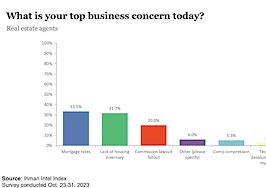The verdict is in — the old way of doing business is over. Join us at Inman Connect New York Jan. 23-25, when together we’ll conquer today’s market challenges and prepare for tomorrow’s opportunities. Defy the market and bet big on your future.
Pre-sale home improvement company Curbio trapped elderly homeowners into contracts that took away their home equity upon sale, charged Washington, D.C. Attorney General Brian Schwalb in a new suit filed on Monday in the civil division of the District of Columbia Superior Court.
Curbio did this through a “scheme of deception, intimidation, and fraud,” and while acting as an unlicensed lender for over 100 properties in the District, Schwalb said in the lawsuit.
The suit alleges Curbio “repeatedly” violated the District’s laws around protecting elderly adults and that it violated consumer protection laws through “deception, intimidation, and fraud.”
“Every aspect of Curbio’s business model is designed to line its pockets by taking advantage of District homeowners,” Schwalb said in a statement on Monday.
Curbio calls itself the “Realtor’s No. 1 contractor.” It acts as a general contractor for pre-sale home improvements, offering a wide range of repairs for no upfront cost.
“The reality is that Curbio utilizes a collection of low-cost subcontractors to deliver an over-priced, low-quality product — after locking consumers into a one-sided contract from which there is no escape,” the lawsuit alleges.

Washington D.C. Attorney General Brian Schwalb
“Recognizing the financial significance the sale of the family home can have for District residents, Curbio targets elderly residents with an unconscionable scheme that lures them in with false promises of quick, high-quality renovations promised to generate heightened sales prices,” Schwalb said.
“Relying on Curbio’s misleading claims, District consumers — including the elderly, the vulnerable, the disadvantaged, and families inheriting homes that, for many, represent the full store of inter-generational wealth — end up paying premium-grade prices for lowest-bidder work.”
In response to the lawsuit, a Curbio spokesperson said the company strongly disagreed with Schwalb’s lawsuit.
“Not only are the assertions made in the complaint without merit, but they also paint a false narrative of Curbio and the valuable services we provide,” the company said. “Curbio has had over 200 customers in D.C. since 2018, and the overwhelming majority of our projects in D.C. are completed, go on the market, sell, and we are paid with no issues.”
The company said Schwalb “cherry picked” a handful of examples that ran contrary to its clients’ typical experience.
“We believe our customers are reflective of the overall market of sellers, and we tell customers and agents that Curbio is a valuable option for anyone who is ready to sell their home,” the company’s spokesperson said. “Curbio is a general contracting business that works with integrity, and we look forward to defending our strong track record of providing quality services to our customers.”
Curbio was founded in 2017 as a way for real estate agents and their clients to conduct repairs while using Curbio’s network of contractors.
The company pitched agents to refer clients to the company because of its ability to work with its network of subcontractors and streamline projects ranging from light pre-listing updates to full gut renovations, the lawsuit says.
In the past, the company said it was able to earn a higher return on investment for projects it oversees than homeowners would otherwise see if they worked with a subcontractor on their own.
“Curbio’s marketing claims, stated authoritatively as fact and without caveat or disclaimer, sound too good to be true — because they are not true,” the lawsuit alleges. “Curbio uses this vast array of promises and misrepresentations to gain consumers’ confidence — it then uses that confidence to ensnare customers in its exploitative and unconscionable contract.”
Despite previously marketing its services as a way to raise homes’ value, Curbio’s clients signed contracts that included a clause stating that it had not told its customers that renovations it oversaw would increase a home’s sale price or decrease the days on market despite marketing materials that said otherwise.
According to the suit, “Curbio knows that most home sellers — and a significant percentage of its customers — are seniors.” It cited a marketing email sent to real estate agents in July 2019 which noted that “76 percent of people who sold their home last year were seniors” and offered a “data-rich webinar” for real estate agents that promised to show how Curbio could help senior homeowners obtain “‘the best possible price’ for their homes ‘without taking out a loan.'”
Schwalb said Curbio would place liens on the property’s title and threatened to foreclose on the property if homeowners violated the terms of their agreement, including that they make no direct contact with subcontractors doing the work.
In response, Curbio said it had never foreclosed on a home.
“Like other general contractors Curbio has filed mechanics liens in certain situations to help ensure payment,” the company said.
Separate court filings related to those liens shed more light on the battles that have happened between Curbio and its clients.
Details from other Curbio lawsuits
According to a lawsuit Curbio filed against one of its clients in Sacramento, contracts required Curbio clients to list their homes within five days of work being completed.
That would, at times, lead to disputes between the company and its clients. According to details from multiple court filings, Curbio would deem projects complete and demand payment and homeowners would disagree.
While Curbio said it could complete projects up to 65 percent faster than other general contractors, multiple homeowners alleged it took much longer than the timelines outlined in the contracts and that work was inadequate.
Properties were to be listed on a multiple listing service and remain active until they were under contract, according to documents included in the Sacramento case. If a property fell out of contract without closing, the homeowner was required to instruct their real estate agent to list it again until it sold.
The Sacramento lawsuit alleged the homeowner, Curbio’s client, failed to pay for work conducted on the property. Contracts require owners to pay 18 percent annual interest plus attorneys’ fees.
The homeowner in that case filed a counterclaim, alleging that Curbio hadn’t completed much of the work the two agreed to and that some of the work completed was inadequate, according to the countersuit.
“In addition to the above lack of performance, some of the work that was performed under the contract has fallen short of the standard of workmanship expected of a contractor such as a bad fitting toilet, failure to remove nails, unlevelled [sic] fridge, to name some,” the client’s counterclaim says.
Those cases represent individual suits between Curbio and its clients around possible breaches of contract. The D.C. filing likely represents the most significant challenge to the company.
Schwalb asked the court to order Curbio to pay restitution for work conducted in the District if they were found to violate District laws, plus other penalties. It also asked the court to nullify Curbio contracts in the area and to void all liens.
“My office will continue to use the full force of the law to protect District residents from predatory practices and ensure homeowners are compensated for the financial harm Curbio imposed,” Schwalb said.
Get Inman’s Property Portfolio Newsletter delivered right to your inbox. A weekly roundup of news that real estate investors need to stay on top, delivered every Tuesday. Click here to subscribe.













